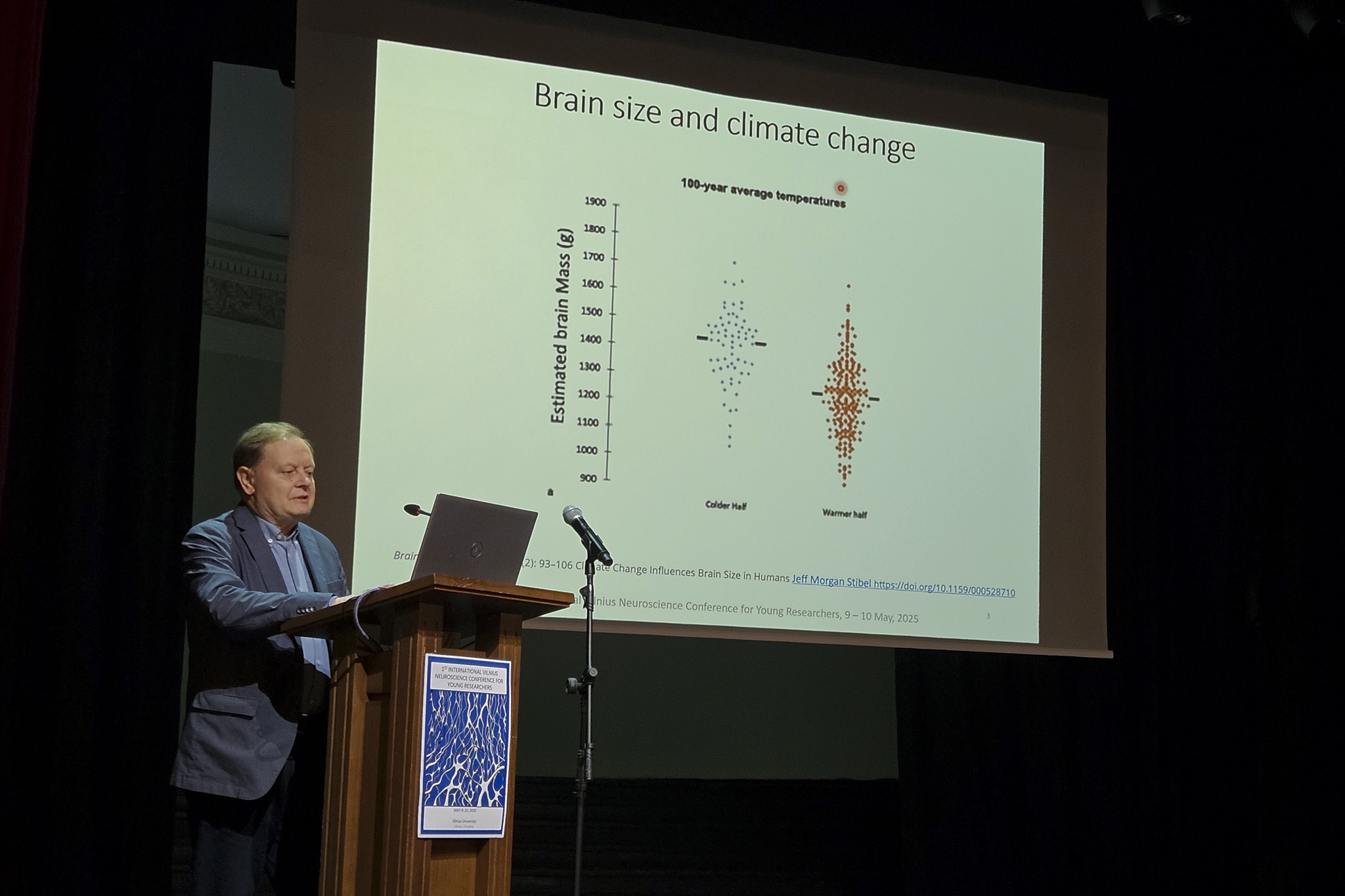Valuable Scientific Insights for Young Researchers at the First International Vilnius Neuroscience Conference

On 9–10 May, the first international Vilnius Neuroscience Conference took place, organised by researchers from the Faculty of Medicine at Vilnius University (VU MF). The event aimed to bring together young researchers interested in clinical neurology, neurosurgery, psychiatry, and related scientific fields while encouraging experienced scientists to share their knowledge and expertise with the younger generation.
The conference was opened by Prof Rūta Mameniškienė from the VU MF Clinic of Neurology and Neurosurgery, Dean of the Faculty of Medicine Prof Dalius Jatužis, and VU Pro-Rector for Research Prof Gintaras Valušis. They encouraged the young participants to remain curious and to present their work with confidence.
According to the main organiser of the conference, Prof R. Mameniškienė, neuroscience brings together professionals from diverse disciplines – from scientists conducting fundamental studies to specialists in neurology, neurosurgery, and mental health.
“There are also close links with other clinical specialities, such as toxicology. They all have a common goal – to reveal the functioning of the brain and find ways to effectively prevent or treat diseases of the nervous system,” she said.
She added that depending on their specific field, researchers differ significantly in the methods they apply, the focus of their interests, and the scientific perspectives they adopt.
“Having observed for many years that interest in neuroscience remains strong among the youngest members of the academic community, and seeing that brain health is increasingly recognised as a key public health goal, the idea emerged to organise a dedicated neuroscience conference for young researchers – one that would unite them under a common theme while also encouraging more active interdisciplinary discussion,” said Prof R. Mameniškienė.
The plenary sessions on the first day featured lectures by invited speakers. Professor Artūras Petronis from the Institute of Biotechnology at Vilnius University’s Life Sciences Centre (VU LSC) delivered a talk on the potential significance of cyclic changes at both cellular and population levels and their implications for pathogenetic disease mechanisms.
A lecture on the complexity and dynamics of cerebral circulation throughout human evolution was given by neurologist Prof Dalius Jatužis of VU MF. Attendees also had the opportunity to hear from toxicologist and Prof Robertas Badaras, who spoke about how scientific research is conducted in what might seem a highly practical field – toxicology. Meanwhile, Prof Osvaldas Rukšėnas (VU LSC) discussed the latest findings on structural brain changes in the contexts of evolution and human development. In addition, Prof Sigita Lesinskienė, an adolescent psychiatrist-psychotherapist at the Child Development Centre of Santaros Clinics, Vilnius University Hospital, presented the challenges of applying the scientific method and nosology in psychiatry.
On the second day of the plenary sessions, a lecture was delivered by Prof Saulius Ročka, neurosurgeon and Head of the Center for Neurosurgery at VU Hospital`s Santaros Clinics. He explored the broad research potential of the field of neurosurgery. There was also a comprehensive lecture on the components of pain by the Head of the Peripheral Nervous System and Neuromuscular Diseases Sector, Department of Neurology at the Hospital of Lithuanian University of Health Sciences Kaunas Clinics and Vice Chancellor of the Lithuanian University of Health Sciences, neurologist, Prof Kęstutis Petrikonis. The session ended with an address from the specialist at the VU MF Research and Innovation Department, Kristijonas Puteikis, who spoke about the joys and challenges in a young researcher’s life.
The central part of the conference – the short oral presentations by young researchers – stood out for their thematic and methodological diversity. A total of 47 scientific works were presented, ranging from fundamental studies on C. Elegans and histopathological research on the hippocampus to the development of artificial liquor currently under development, studies of patient groups suffering from various neurological and psychiatric diseases, and also presentations on particularly rare clinical cases. All abstracts presented at the conference are available to read here.
The conference concluded with an awards ceremony for the best presentations, judged by the scientific committee for their originality, impact, methodological rigour, and quality of delivery:
Place I was awarded to the epilepsy research team – Benas Matuzevičius and Justas Dijokas (VU) – for their presentations “Outcomes of Status Epilepticus: An Analysis of Causes and Predictors” and “The Impact of Prehospital Factors on the Outcomes of Status Epilepticus.”
Place II went to Narges Mohammadrahimi (University of Tartu) for “Endocannabinoid System as a Possible Modulator of Psychiatric Effects of the Adhesion Molecule NEGR1” and Andrius Sakalauskas (VU) for “Developing Artificial Cerebrospinal Fluid for Studying Neurodegeneration-related Protein Aggregation.”
Third Place went to Laima Skėrutė (VU) for “Patent Foramen Ovale and Stroke: Applying the Pascal Classification to Improve Secondary Prevention Strategies,” Aida Emilija Balukonytė (VU) for “The Impact of Background Noise on Cognitive Performance and Contributing Factors,” and Nojus Staknys (Vrije Universiteit Amsterdam) for “Quantitative Comparison of C. elegans Growth and Development in Monoxenic and Axenic Medium.”
The event was organised by researchers from VU MF in collaboration with the Lithuanian Society for Epileptology, the Lithuanian Association of Neurologists, the Lithuanian Neuroscience Association, the Lithuanian Stroke Association and the Lithuanian Association of Apheresis and Clinical Toxicology.